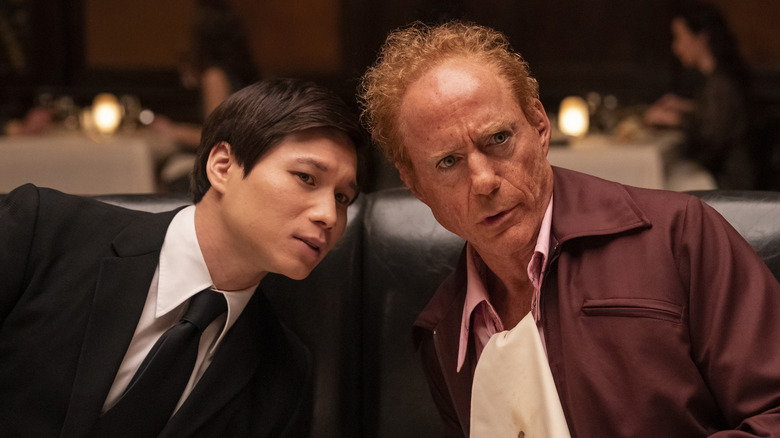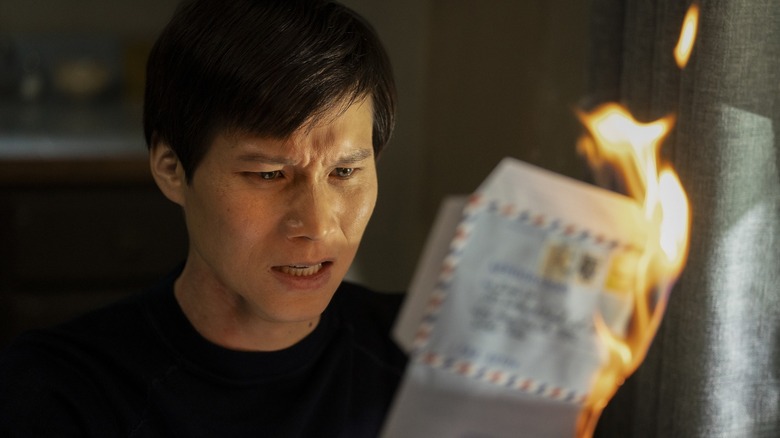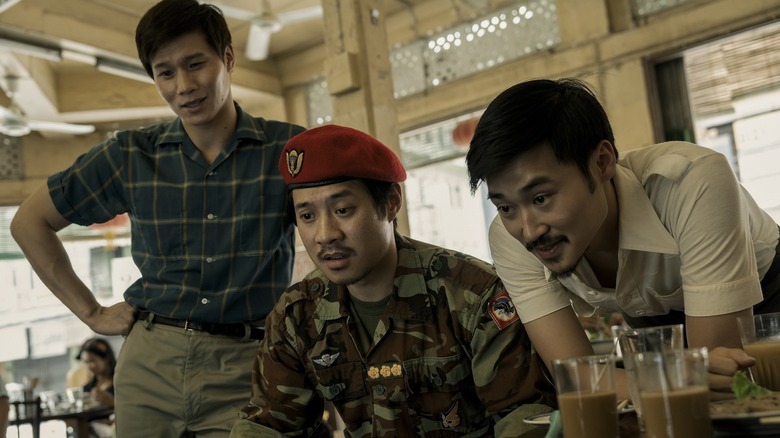The Sympathizer Review: Apocalypse Wow!
- One of the sharpest satires about American imperialism ever put to screen
- A revelatory lead performance from Hoa Xuande
- The material finds the perfect director in Park Chan-wook
- Sometimes the characterizations can get a little too broad and silly for their own good
Robert Downey Jr. is back in Vietnam, only this time, the multi-faceted satire around him about imperialism, racism, and — eventually — how Hollywood struggles to meaningfully depict both, proves far sharper than his previous jaunt to the jungle in "Tropic Thunder."
The recent Oscar-winner isn't the lead of Park Chan-wook and Don McKellar's miniseries adaptation of Viet Thanh Nguyen's Pulitzer-winning novel, but his supporting appearances as various grotesque figures throughout are an effective illustration of the ways prejudicial rot has taken hold at every level amongst the rich and powerful. It's far from subtle, and sees the actor return to the same level of motor-mouthed ham Christopher Nolan managed to coax him away from in "Oppenheimer." But then again, this is a red scare-era satire aiming for the sweet spot between high and lowbrow, just like its obvious influence "Dr Strangelove or: How I Learned To Stop Worrying And Love The Bomb" — the lack of subtlety is the point.
Inside the mind of an unreliable narrator
The first of Robert Downey Jr.'s characters that we meet is a CIA agent who acts as the handler for the unnamed protagonist known only as the Captain (Hoa Xuande), an advisor to a General in South Vietnam in the lead-up to the Fall of Saigon in 1975. However, unbeknownst to those in his orbit, he's a mole for the North Vietnamese who yearns for the imminent communist revolution — something we know, from the beginning of the series, never materializes thanks to a framing device where he's questioned for months about his American sympathies in a remote re-education camp. Before we arrive there though, the Captain is responsible for choosing which people he can get on the last flight out of Saigon, hoping to orchestrate proceedings so those at the top of the food chain are left behind for questioning and imprisonment. Unfortunately, he's given a new mission to fly to America so he can keep tabs on the General and any American plans to restart the conflict following an embarrassing loss on the battlefield.
If you're familiar with director Park Chan-wook's prior work, then the opening episode firmly places the series within his wheelhouse of twisty thrillers that thrive in morally gray areas, jumping between time frames to try and get under the skin of their unreliable narrators. Unlike the two sides to the procedural in his Korean breakout effort "Joint Security Area" or the dueling perspectives in 2016's "The Handmaiden," here the polarizing allegiances are all firmly within the headspace of one character, who frequently pauses the action to rip up the story he's told so far to start again.
Xuande, whose performance is one of the least showy within the heightened landscape of the series, likely won't get the plaudits he deserves, so adept at communicating the crisis of faith that comes with maneuvering between two opposing loyalties that the mental gymnastics required to pull it off never feel apparent. Downey Jr. may undergo several physical transformations, but the same rotten core can be found in each character he plays, unshakable in its awfulness; the Captain's mission grows more emotionally complicated the more he becomes settled in America, even as he's repulsed by much of the culture around him, two sympathies wrestling under the same exterior. The masterstroke to Xuande's performance is the way in which his façade cracks as the show progresses, utilizing narration less to sell his character's inner torment as he struggles to keep himself at a calculated remove.
An intoxicating satire — even when it misses the mark
"The Sympathizer" gravitates further away from conventional thriller territory as it proceeds. It becomes more of an episodic character study about the protagonist's emotional estrangement from both sides of the war, with installments jumping from Hollywood satire to Coen Brothers-inspired crime farce. The former firmly places "Tropic Thunder" within its shadow, with a detour to the set of a Vietnam movie the protagonist has been hired to advise on. Whereas that Ben Stiller comedy centered all of its gags on actors' egos and overbearing pretentiousness, creating a simplistic, one-note satire, here the canvas is broadened to poke holes at the industry's historical treatment of Asian actors, right down to Robert Downey Jr.'s director character demanding that the Vietnamese characters have no dialogue, as it's a "cliché" to have them describe their feelings in any form. It's a blunt takedown of how white filmmakers within the Hollywood system have failed to do justice to the traumas suffered by marginalized groups when telling stories about them, and is the hour when the show's wide-ranging satire is at its most focused, with less of the zaniness that characterizes other episodes.
A more divisive moment arises in Episode 2, when our protagonist arrives in the U.S. and is assigned to speak to a journalism student in a California college. There, he meets a white professor of Asian-American studies who is far more interested in perpetuating discredited "race science" than their culture itself. He's both a physical monster as well as a metaphorical one, with his first appearance showing Downey Jr. stripping to the waist and revealing belly prosthetics only slightly more subtle than Baron Van Harkonnen in "Dune." However, the deliberate broadness of this villainous persona may get lost behind criticism of the performance, a mincing gay stereotype that might be more offensive than his "Tropic Thunder" turn because there's no requirement for that characteristic within the script itself. But then again, as the current Democratic administration fumbles its way through navigating an international conflict with seemingly little care for its victims, there may be a sharper, not to mention timelier, commentary lingering beneath an outdated conceit; a seemingly "liberal" person whose bloodthirsty attitudes are hiding in plain sight.
Aside from working with a master director, by the end of the series, it clicked for me that the main attraction to "The Sympathizer" for Downey Jr. was likely that it was the closest project he's ever been offered to one of his filmmaking father's freewheeling political comedies, the most well-known of which — 1969's "Putney Swope" — would make for a raucous double bill about American racism in the Vietnam era. There's an intoxicating messiness to the seven-part series, but the nihilistic worldview makes it all coalesce into a coherent character study by its close, using that cynicism to get under its unknowable lead's skin with surprisingly affecting results.
"The Sympathizer" hits HBO on April 14.


